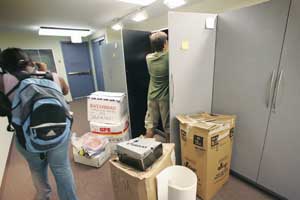Room 001 makes room for student organizations with new lockers
By Josh SchonwaldNews Office
 A student utilizes the storage space recently added to the RSO Resource Center in the lower level of the Reynolds Club. Since students use the space more for storage than for work, the Office of the Reynolds Club and Student Activities replaced bulky cubicles with 70 shelved storage spaces. With the increase in storage, 40 additional student organizations will receive a storage space this year. The number of both undergraduate and graduate student organizations has continually numbered more than 300 at the University in the past few years. | |
Thanks to a summer renovation, managing a student organization at the University just got a lot easier.
This fall, the University opened the revamped RSO Resource Center in the lower level of the Reynolds Club. Not only does the newly renovated Room 001 expand the number of dedicated spaces available to student leaders, it also greatly improves access to student organization services.
In previous years, managers of the more than 300 RSOs (recognized student organizations) had to commute across campus to get staff support, or to use University-allocated storage facilities, fax services, and work and conference space. “But now it’s all centralized right here. The only thing they can’t do here is reserve space,” said Diana Doty, Activities Resource Coordinator at the Reynolds Club. “But that can be accomplished right down the hall or via email.”
The University’s redesign of the space addresses some of the student needs that have changed largely because of technology. “The old assumption was that student groups needed office space,” said Sharlene Holly, Director of the Office of the Reynolds Club and Student Activities (ORCSA). But with the popularity of cellular phones and wireless laptops, students increasingly used the cramped cubicles not for office work, but for storage. So last winter, when student activities staff started talking with students about their needs and aspirations for the redesigned space, it became clear: the cubicles had to go.
Replacing the cubicles that monopolized most of the basement space are 70 shelved storage spaces. With the increase in storage, the Resource Center has been able to provide dedicated space to 40 more student organizations this year. Some student organizations have dedicated space for the first time. “We’ve eased some of the problem,” Doty said.
The new storage spaces in Room 001 are making life for student organizers easier and a little less cluttered. Knitting Club members no longer have dorm rooms full of yarn, and the organizers of Sista Friends will not be overwhelmed by group literature and materials in their apartments.
In addition to increased storage, the new center now has work and conference space, a copying and fax center, and a Student Resources Help Desk, which is open from 9 a.m. to 6 p.m. daily. Student staff has been expanded from four to eight employees. And soon, the center will have a computer lab. In addition, Regine Desruisseaux, Student Activities Coordinator, is now based in the center.
A much-needed cosmetic makeover also was completed in this basement space. Painted beige and mauve since 1995, Room 001 now has a bright post-modern look, with its exposed plumbing painted bright blue and yellow.
With a revamped space and more storage, ORCSA is responding to the space crunch on campus, due in large part to the tremendous growth in student extracurricular interests, said Holly. During the past several years, the number of both undergraduate and graduate student organizations has continually numbered more than 300.
Bill Michel, Assistant Vice-President for Student Life in the University and Associate Dean in the College, is pleased with the improvements.
“There’s a tremendous amount of interest in extracurricular activities,” said Michel. “More and more students are becoming active out of the classroom. I am glad ORCSA has worked with students to enhance their space and accommodate their interests.”
![[Chronicle]](/images/sidebar_header_oct06.gif)